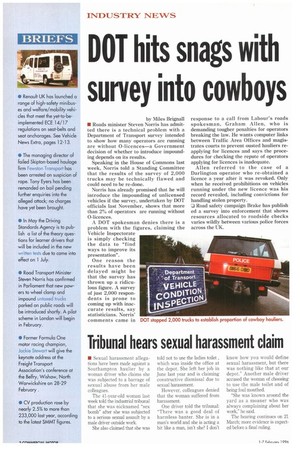DOT hits snags with survey into cowboys
Page 4

If you've noticed an error in this article please click here to report it so we can fix it.
by Miles Brignall • Roads minister Steven Norris has admitted there is a technical problem with a Department of Transport survey intended to show how many operators are running are without 0-licences—a Government decision of whether to introduce impounding depends on its results.
Speaking in the House of Commons last week, Norris told a Standing Committee that the results of the survey of 2,000 trucks may be technically flawed and could need to be re-done.
Norris has already promised that he will introduce the impounding of unlicensed vehicles if the survey, undertaken by DOT officials last November, shows that more than 2% of operators are running without 0-licences.
One reason the results have been delayed might be that the survey has thrown up a ridiculous figure. A survey of just 2,000 respondents is prone to coming up with inaccurate results, say statisticians. Norris' comments came in response to a call from Labour's roads spokesman, Graham Allen, who is demanding tougher penalties for operators breaking the law. He wants computer links between Traffic Area Offices and magistrates courts to prevent ousted hauliers reapplying for licences and says the procedures for checking the repute of operators applying for licences is inadequate.
Allen referred to the case of a Darlington operator who re-obtained a licence a year after it was revoked. Only when he received prohibitions on vehicles running under the new licence was his record revealed, including convictions for handling stolen property.
Road safety campaign Brake has publish ed a survey into enforcement that shows resources allocated to roadside checks varies wildly between various police forces across the UK.
































































































